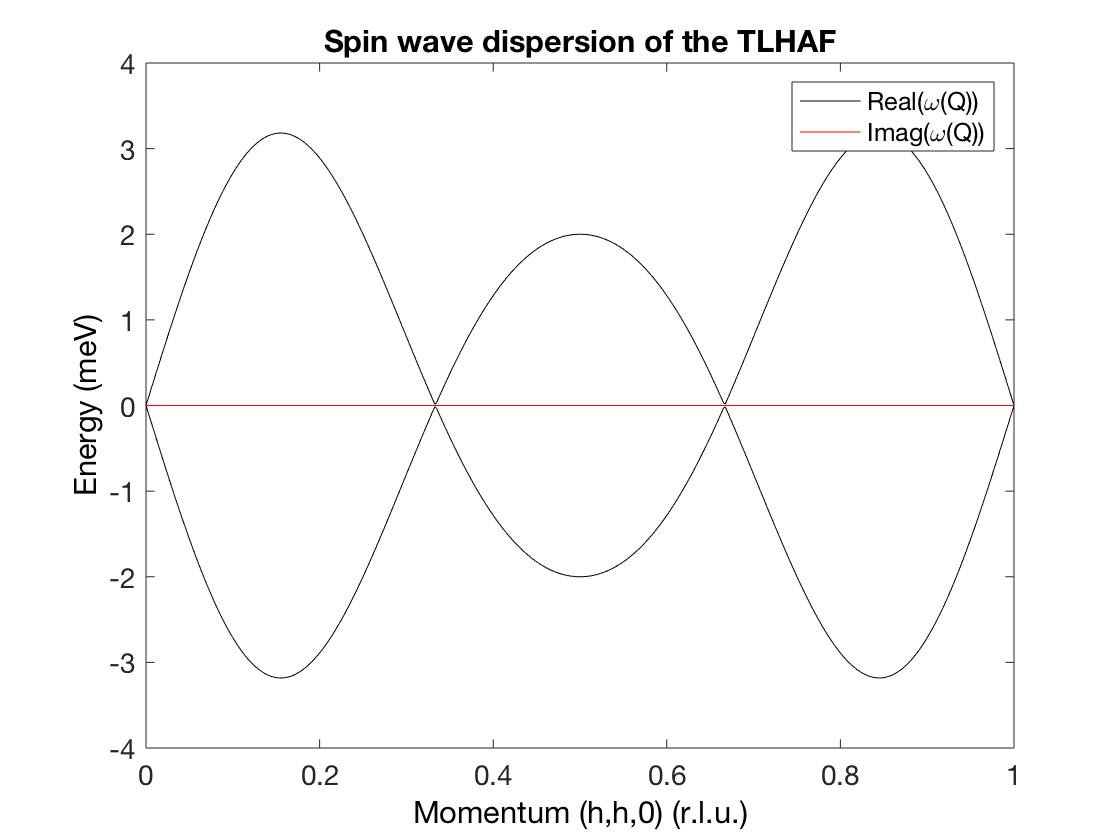Syntax
spectra = spinwavesym(obj,Name,Value)
Description
spectra = spinwavesym(obj,Name,Value) calculates symbolic spin wave
dispersion as a function of \(Q\). The function can deal with arbitrary
magnetic structure and magnetic interactions as well as single ion
anisotropy and magnetic field. Biquadratic exchange interactions are also
implemented, however only for \(k=0\) magnetic structures.
If the magnetic propagation vector is non-integer, the dispersion is calculated using a coordinate system rotating from cell to cell. In this case the Hamiltonian has to fulfill this extra rotational symmetry.
The method works for incommensurate structures, however the calculated omega dispersion does not contain the \(\omega(\mathbf{k}\pm \mathbf{k}_m)\) terms that has to be added manually.
The method for matrix diagonalization is according to R.M. White, PR 139 (1965) A450. The non-Hermitian g*H matrix will be diagonalised.
Examples
The first section of the example calculates the symbolic spin wave spectrum. Unfortunatelly the symbolic expression needs manipulations to bring it to readable form. To check the solution, the second section converts the symbolic expression into a numerical vector and the third section plots the real and imaginary part of the solution.
tri = sw_model('triAF',1)
tri.symbolic(true)
tri.genmagstr('mode','direct','k',[1/3 1/3 0],'S',[1 0 0])
symSpec = tri.spinwave
pretty(symSpec.omega)
Output
/ -#1 \
| |
\ #1 /
where
sqrt(2) J_1 exp(-4 pi #2) sqrt(exp(2 pi #2) + #6 + #5 + exp(4 pi #2) 3 + #4 + #3 + exp(6 pi #2)) sqrt(- exp(2 pi #2) - #6 - #5 + exp(4 pi #2) 6 - #4 - #3 - exp(6 pi #2))
#1 == -------------------------------------------------------------------------------------------------------------------------------------------------------------------------
2
#2 == h 1i + k 1i
#3 == exp(2 pi (h 3i + k 2i))
#4 == exp(2 pi (h 2i + k 3i))
#5 == exp(2 pi (h 2i + k 1i))
#6 == exp(2 pi (h 1i + k 2i))
J_1 = 1
h = linspace(0,1,500)
k = h
omega = eval(symSpec.omega)
p1 = plot(h,real(omega(1,:)),'k-')
hold on
plot(h,real(omega(2,:)),'k-')
p2 = plot(h,imag(omega(1,:)),'r-')
plot(h,imag(omega(2,:)),'r-')
xlabel('Momentum (h,h,0) (r.l.u.)')
ylabel('Energy (meV)')
legend([p1 p2],'Real(\omega(Q))','Imag(\omega(Q))')
title('Spin wave dispersion of the TLHAF')

Input Arguments
obj- spinw object.
Name-Value Pair Arguments
'hkl'- Symbolic definition of \(Q\) vector. Default is the general \(Q\)
point:
hkl = [sym('h') sym('k') sym('l')] 'eig'- If true the symbolic Hamiltonian is diagonalised symbolically. For
large matrices (many magnetic atom per unit cell) this might be
impossible. Set
eigtofalseto output only the quadratic Hamiltonian. Default istrue. 'vect'- If
truethe eigenvectors are also calculated. Default isfalse. 'tol'- Tolerance of the incommensurability of the magnetic ordering wavevector. Deviations from integer values of the ordering wavevector smaller than the tolerance are considered to be commensurate. Default value is \(10^{-4}\).
'norm'- Whether to produce the normalized symbolic eigenvectors. It can be
impossible for large matrices, in that case set it to
false. Default istrue. 'fid'- Defines whether to provide text output. The default value is determined
by the
fidpreference stored in swpref. The possible values are:0No text output is generated.1Text output in the MATLAB Command Window.fidFile ID provided by thefopencommand, the output is written into the opened file stream.
'title'- Gives a title string to the simulation that is saved in the output.
Output Arguments
spectra- Structure, with the following fields:
omegaCalculated spin wave dispersion, dimensins are \([2*n_{magExt}\times n_{hkl}]\), where \(n_{magExt}\) is the number of magnetic atoms in the extended unit cell.V0Eigenvectors of the quadratic Hamiltonian.VNormalized eigenvectors of the quadratic Hamiltonian.hamSymbolic matrix of the Hamiltonian.incommWhether the spectra calculated is incommensurate or not.objThe clone of the inputobj.